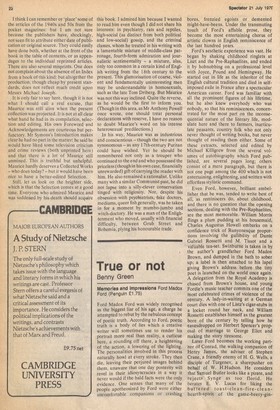True or not
Benny Green
Memortes and Impressions Ford Madox Ford (Penguin £1.75) Ford Madox Ford was widely recognised as the biggest liar of his age, a charge he attempted to rebut by the nebulous concept of poetic truth. According to Ford, poetic truth is a body of lies which a creative writer will sometimes use to render his portrait more real than reality, a curlicue here, a rounding off there, a heightening of the action, a lowering of the lighting. The personalities involved in this process naturally howl at every stroke. They then die, leaving their perjured images behind them, unaware that one day posterity will revel in their idiosyncracies in a way it never would if the bald facts were the only evidence. One senses that many of the people apotheosized by Ford were either uncomfortable companions or crashing bores, frenzied egoists or demented might-have-beens. Under the transmuting touch of Ford's affable prose, they become the most entertaining chorus of artistic clowns in English reminiscence of the last hundred years.
Ford's aesthetic experience was vast. He began by shaking childhood ringlets at Liszt and the Pre-Raphaelites, and ended it by hobnobbing on a professional level with Joyce, Pound and Hemingway. He started out in life as the inheritor of the English cultural tradition and died in selfimposed exile in France after a spectacular American career. Ford was familiar with all the prominent figures of his lifetime, but he also knew everybody who was nobody, so that his reminiscences, concentrated for the most part on the inconsequential nature of the literary life, modulate here and there to farmers, inarticulate peasants, country folk who not only never thought of writing books, but never thought of reading them either. Some of these extracts, selected and edited by Michael Killigrew from the several volumes of autobiography which Ford published, are several pages long; others consist of a mere paragraph, but there is not one page among the 400 which is not entertaining, enlightening, and written with effortless stylistic command.
Even Ford, however, brilliant embellisher that he was, tended to write best of all, as reminiscers 'do, about childhood, and there is no question that the opening sections, dealing with the Pre-Raphaelites, are the most memorable. William Morris flings a plum pudding at his housemaid, Charles Augustus Howell embarks on a confidence trick of Runyonesque proportions involving the gullibility of Dante Gabriel Rossetti and M. Tissot and a valuable tea-set. Swinburne is taken in by the author's grandfather Ford Madox Brown, and dumped in the bath to sober up; a label is then attached to his lapel giving Brown's address before the tiny poet is launched on the world once again. A delegation from the Royal Academy is chased from Brown's house, and young Fordie's music teacher commits one of the most celebrated crimes of violence of the century. A lady-in-waiting at a German court dies with one of Listz's cigar-stubs in a locket round her neck, and William Rossetti establishes himself as the greatest bore of the century by telling how he eavesdropped on Herbert Spencer's proposal of marriage to George Eliot and making the story tiresome.
Later Ford becomes the working partner of Conrad, the walking companion of Henry James, the adviser of Stephen Crane, a friendly enemy of H. G. Wells, a disciple of Turgenev, a sharepusher on behalf of W. H.Hudson. He considers that Samuel Butler looks like a pirate, and rejects Synge as too florid. He berates E. V. Lucas for liking the buttered toast-clean-fire-cleanhearth-spirit of the game-beery-gin
sodden-sentimentalism' of Charles Lamb, and complains to the reader that the trouble with D. H. Lawrence was that he 'kept one in a constant state of solicitude' He tells a comically absurd tale of John Galsworthy cheated out of all his money on a train journey by a thimblerigger; 'It became apparent gradually to me', writes Ford, 'that Galsworthy was never meant to be a novelist.' Wells reads More's Utopia and discovers that 'there's something in those old classics after all'.
Perhaps the easiest way of conveying the extraordinary flavour of Ford's gossip is to quote it. Here is his description of the etiquette of the Edwardian literary life. He, Conrad and Wells are neighbours: Conrad had odd, formal notions of how one should proceed in the life literary. As far as he was concerned the purpose of the call on Wells was to announce to the world of letters that we were engaged in collaboration. To me this was a matter of indifference except for a disinclination to pay calls at any time. But Conrad liked proceedings of a State nature. He would have liked the driving in a barouche to pay calls on Academicians. . and vivid in my mind is the feeling I had, as we drove down the sloping railway bridge above Sandling Junction. I was like a brown paper parcel on a seat beside a functionary in a green uniform, decorated with golden palm-leaves and a feathered cocked hat.
True or untrue? Ford defends himself by describing his reminiscences as 'books of impressions'. The impressions are certainly true enough, and they now comprise the most wonderful literary bedside book of the decade..



































 Previous page
Previous page